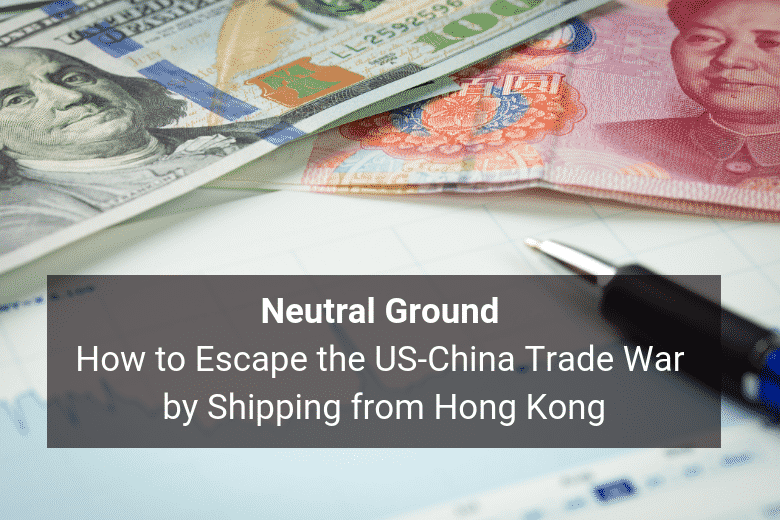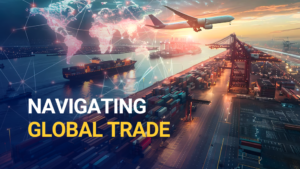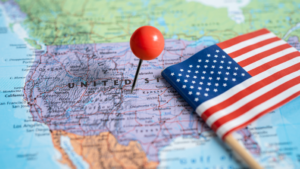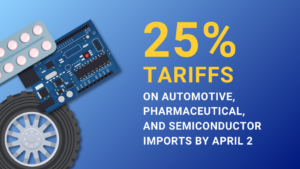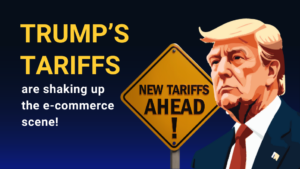Since his inauguration, President Donald Trump has kept his campaign promises by aggressively looking to reassert America’s role as the world’s manufacturing leader in detriment of China.
Starting on January of this year, when President Trump imposed tariffs on solar panels and washing machines, America’s tariff wall has extended to cover everything from steel and aluminum to vegetable juices, luxury handbags, and a wide array of home goods.
However, instead of cooling down the conflict will continue to escalate as starting next year Chinese products facing a 10% tariff will jump to 25%. For American companies, especially ecommerce businesses and crowdfunders depending on Chinese-made products, escalation could mean their ruin as growing tariffs will continue to shrink their profit margins.
Fortunately for them, Hong Kong has largely managed to avoid the effects of this conflict and is in an enviable position to serve as a bridge for cross-border commerce between both countries. As China and America square off, the Pearl of the Orient is reaffirming its place as the point of entry and exit for the Middle Kingdom.
But why Hong Kong? How can this lone city escape Trump’s tariffs unscathed and become the best solution for cross-border order fulfillment to the US from China? Well, with the ceasefire to this conflict still very far, we decided to take our time to examine these questions.
Keep reading below to find the benefits of shipping, and setting your fulfillment and warehousing facilities in this great city.
A safe haven amidst the raging trade war
Hong Kong’s unique position is the result of its history as a British colony and its negotiated incorporation to the People’s Republic of China. Unlike any other Chinese province or city, Hong Kong is partly autonomous and enjoys a remarkable amount of independence and freedom. So much, in fact, that it even possesses its own currency and tax system.
In 1995, Hong Kong became a founding member of the World Trade Organization (WTO) and to this day has maintained itself as an independent economic and customs area.
Hong Kong’s status as a separate territory, for issues regarding cross-border trade and economics, has also been respected since Congress passed the United States-Hong Kong Policy Act in 1992. This act recognizes Hong Kong as a separate customs’ territory. A key factor that, when added to its separate membership in the WTO, explain why Trump’s tariffs don’t apply to Hong Kong.
Hong Kong’s economy has also escaped the negative effects of the tariffs almost completely and the warehousing and shipping services offered in its free port are now in demand more than ever.
Regardless of the posturing or menacing talk coming from both countries, Hong Kong’s low tax rates and simple shipping procedures will only increase its importance for cross-border trade in the near future.
All roads and shipping lanes lead to Hong Kong
Whereas Shanghai is slightly closer to the US, Hong Kong enjoys an unrivaled location lying in the center of the major shipping lanes of the Asia-Pacific region. From its port, ships can easily go to Southeast Asia, the Suez Canal, Panama, and America.
Moreover, its land connections with Mainland China are excellent. A modern network of roads and railways connecting Hong Kong with the country’s major cities guarantee a speedy delivery of manufactured goods from the factories to the city’s warehouses and container ships. Add to that being serviced by over 100 airlines with direct flights to more than 200 cities and you have a world class re-export hub.
Chinese and foreign businesses haven’t failed to identify these advantages, many of them setting up their own factories and warehouses in the surrounding Pearl Delta Region. While Shanghai is still the country’s biggest industrial center, Hong Kong’s port services a number of growing industrial regions along the southern coast which produce 33% of China’s industrial output and represent most of its exports.
Overseas companies looking for fulfillment services can partner with a Hong Kong company to guarantee a steady flow of quality products at competitive prices, as these businesses have the knowledge of local laws and taxes needed to guarantee the smooth flow of trade across borders.
Storing and shipping from Hong Kong lower total costs
The new trade barriers have severely curtailed American businesses by increasing the costs of importing from China, disrupting established supply chains, and ensuring that investing in the volatile Mainland remains incredibly risky. The biggest losers, of course, have been the consumers who, if they get their products delivered at all, have to pay the increased costs of transportation and new tariffs.
As a free port, Hong Kong offers an alternative way to store and fulfill their orders that aren’t affected by the American tariffs or political developments in China. Currently, there is a 25% tax increase on Chinese imports in America which, not applying to Hong Kong, make the Pearl of the Orient the most cost-effective solution.
Hong Kong’s Special Administrative Region status benefits overseas importers who don’t need to pay any exports or sales taxes for their shipments. At most, only a limited number of regulated goods are taxed — liquors, tobacco products, hydrocarbon oil, and methyl alcohol.
Visa procedures and export formalities are very relaxed as well. There are no surcharge or goods and service taxes, and products can be exported without approval as long as the required formalities are submitted within 14 days of the shipment’s departure.
Moreover, on the other side of the Ocean, the protection afforded by the United States-Hong Kong Policy Act of 1992 means the US can’t impose any tariffs on Hong Kong imports which are valued under $800. A crucial detail which makes all the difference in the world for the small-medium ecommerce companies and crowdfunders.
Local companies offer an impressive array of services for foreign clients
Despite its economic freedom, Hong Kong wouldn’t be the same if its Chinese exporters weren’t also benefiting from its liberal economic policies. Unlike Mainland China, where the transfer of funds in and out of the country is heavily regulated, Hong Kong’s laissez-faire attitude gives local businesses the freedom they need to grow and accumulate capital without high fees to restrict them.
As a result of this policy, the city has a diverse array of middleman companies — courier services, fulfillment centers, packing warehouses, etc. — which can help American importers to move their orders smoothly and take care of all the customs’ procedures.
Hong Kong has a flat rate of 17.5 percent on corporate profits as well as no taxes on capital gains, sales, dividends or income earned outside the SAR. Beijing imposes no taxes on the region but, thanks to the Closer Economic Partnership Arrangement (CEPA), local companies enjoy preferential access to the Mainland’s market.
Even without the distorting effects of the trade war, local companies enjoy an unparalleled advantage over their Mainland counterparts, being capable of moving capital, goods, and profits across borders with a freedom that Mainlanders can only dream of.
The city’s first-class infrastructure ensures the speedy delivery of goods
While Mainland China’s industrial growth is impressive, its logistical infrastructure leaves much to be desired. The country’s roads and railway lines are still few and barely maintained — especially in the interior — which makes for frequent delivery delays and additional transport costs.
By comparison, Hong Kong shippers can make use of an excellent transport network comparable to those found in first world nations.
High-speed trains, rationally designed highways, and a well-maintained fleet of trucks connect the city with the manufacturing bases located in the Pearl River Delta, ensuring a seamless flow of products from the assembly lines to the container ships in the port.
Hong Kong’s port is one of, if not THE, busiest ports in the world. In 2017 alone, 372,610 sea-going ships arrived and departed from Hong Kong. On average, container vessels spend just about 10 hours in the port, being able to unload, load, and set sail the same day they arrived.
The numbers aren’t less impressive when it comes to air traffic capacity. Hong Kong International Airport ranks among the top 3 busiest in the world, moving 4,521,000 tonnes of cargo last year alone.
The friendly regulations and easier communications make doing business easier
Americans traveling to do business in China can expect to experience a culture shock. The party’s meddling in every aspect of the country’s economy, the importance given to Guanxi (social relations) over the rule of law, and the slow bureaucracy, makes managing a successful cross-border fulfillment business in China extremely frustrating for foreigners.
As an ex-British colony, Hong Kong’s business practices have evolved mirroring those of the West and have been in fact largely built on British common law. Western standard banking, business-friendly government practices, compatible legal system, and widespread use of the English language are all factors that make doing business in Hong Kong far easier and more rewarding than working in the Mainland.
Financial infrastructure is particularly well-developed in the city. One of the top five financial hubs in the world, Hong Kong has one of the largest concentrations of international banks in the world, with more than 70 of the top 100 financial institutions — including many American ones — operating within the city’s limits.
Many Fortune 500 companies have moved their headquarters to Hong Kong, drawn by the city’s reputation for facilitating trade and its privileged location next to the workshop of the world.
First-class customer service
Unlike Mainland China, where stringent laws and excessive Party meddling in commerce delay the movement of products, Hong Kong promotes free trade without interference. And nowhere is this difference more visible than when it comes to customer service.
If you’ve ever requested a package from China you know that the Chinese postal system isn’t known for its quality. So forget about using it to cut costs. Delayed packages are more often the rule than the exception, and their package tracking system leaves much to be desired. Especially if you use delivery services like UPS on a frequent basis.
Shipments delivered to the US from Mainland China undergo strict inspections from both Chinese and American customs, resulting in frequent delays and unhappy customers.
By comparison, Hong Kong’s package delivery services are systematic in the way they keep their users informed and regularly update them on their packages’ location. Therefore guarantying packages are delivered swiftly to their destination and that customers keep coming back for more.
Excellent local courier services make sure that shipments are delivered without damages and using the fastest possible route. These companies are usually quite large, allowing them to have a specialist staff dedicated to managing their shipments from start to finish. Something that is especially useful if Free On Board is your preferred shipping method.
American ecommerce entrepreneurs and crowdfunders can be sure that their shipment will arrive on time and in good condition, without having to pay for unexpected duties or being retained in customs longer than it’s needed. All the paperwork necessary to declare the products, store them in a warehouse, and ship them is done on time by a team of specialists.
Since the city’s foundation in 1841, Hong Kong has maintained a reputation for having a “business-first” attitude, putting commerce before politics and staying neutral from neighboring conflicts.
The city’s pragmatic stance and political union with China under the “one country, two systems” agreement has saved Hong Kong from the effects of the ongoing Sino-American trade war, while also increasing its importance as a key trading partner for both countries.
If your company depends on the supply of Chinese goods, shipping and fulfilling your orders from Hong Kong will keep your profits safe from the rising tariffs and sanctions. Better yet, your business will benefit immensely from going global in an environment that is both profitable and flexible.
Come to the Pearl of the Orient and see for yourself how the lower export taxes, preferential trade agreement with the Mainland, ease of transactions, and the city’s growing industrial capabilities launch your business to the next level!
Looking for an Order Fulfillment Provider in Hong Kong?
Floship is one of the main players in eCommerce and Crowdfunding Order Fulfillment based in Hong Kong. We offer unrivaled customer service, dedicated account managers, fully-automated, seamless API integrations with all leading eCommerce platforms, Kickstarter and Indiegogo integrations and competitive rates. We are a Hong Kong based business, but ran by Westerners. With us, you do not need to worry about language barriers or culture differences. We value personal contact and will do our best to provide you with a customized solution.
Interested in shipping from China to the US, from the US to China or anywhere else? Fill out our Free Consultation form and we will get back to you within 48 hours. It is Free, No Strings Attached. Click here to fill out the form!
Author
Ramon den Hartog is Head of Marketing at Floship and an expert on ecommerce, marketing and logistics related topics.

Ready To Upgrade Your Logistic Solution?
Speak to Floship ecommerce logistic consultant about improving your global support chain today

